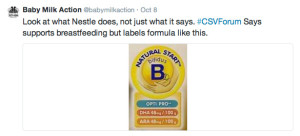Baby Milk Action press release 18 June 2015
A report to be debated by the Methodist Conference in Southport on 29 June 2015 relates that Nestlé continues to systematically violate baby milk marketing rules, citing expert sources Save the Children and the International Baby Food Action Network (IBFAN). It shows that the decision by the Church’s Central Finance Board (CFB) to invest in Nestlé and of the Joint Advisory Committee on the Ethics in Investment (JACEI) to “engage” with Nestlé executives led to the company weakening its baby milk marketing policies.
The report from JACEI was produced after the Lancashire District Synod submitted a memorial to the 2014 Conference calling for greater transparency on the impact of the investment and engagement, which had been presented to the 2006 Conference as a parallel strategy to applying pressure through a consumer boycott (which demonstrably does end some violations).
 There will be a special screening of the soon-to-be released feature film Tigers in Southport on 29 June (screenings in New Brighton and Manchester have sold out). This 90-minute film by Oscar-winning director, Danis Tanovic, dramatises the true story of a former Nestlé baby milk salesman who took on the company with the help of IBFAN. There will then be a 30-minute discussion.
There will be a special screening of the soon-to-be released feature film Tigers in Southport on 29 June (screenings in New Brighton and Manchester have sold out). This 90-minute film by Oscar-winning director, Danis Tanovic, dramatises the true story of a former Nestlé baby milk salesman who took on the company with the help of IBFAN. There will then be a 30-minute discussion.
Baby Milk Action is seeking donations to be able to raise awareness of Nestlé’s current activities alongside the Conference in Southport.
Mike Brady, Campaigns Coordinator at Baby Milk action (the UK member of IBFAN) said:
“We have been grateful for the support of Methodist Church members for the boycott campaign over the years and the interest officials have given this issue, but it was obvious to us from the beginning that the investment strategy would be exploited by Nestlé and so it has proved.
“Past reports to Conference have simply praised Nestlé executives for meeting with church officials without giving any information on what, if anything, was achieved. It is welcome that the JACEI report in 2015 documents both Nestlé’s ongoing contempt for the baby milk marketing rules it should follow and the failure of the CFB/JACEI investment and engagement strategy. What was portrayed as a parallel strategy to the Nestlé boycott has led to Nestlé weakening its baby milk marketing policies, while handing it the PR coup of a listing in the FTSE4Good ethical investment index.
“Many people do not realise Nestlé was admitted to the FTSE4Good Index because the criteria were weakened, not because Nestlé improved. In fact, as the JACEI report documents, Nestlé weakened its policies after JACEI encouraged it to join FTSE4Good as the system is inherently flawed. Surprisingly, the Resolution to Conference simply calls on it to accept the JACEI report and its recommendation to continue with the same failed strategy, so we will watch what happens with interest.”
The JACEI report comments, “For many years JACEI, in its dialogue with Nestlé, encouraged the company to engage with FTSE4Good”. The FTSE4Good ethical investment index is run by the stock exchange listing company FTSE and Nestlé did not meet the Breastmilk Substitutes criteria for inclusion. The JACEI report explains the FTSE4Good criteria were changed in 2010 to make it easier for companies. An Expert Committee on Breast Milk Substitutes advises on the criteria and the inclusion or exclusion of companies and includes the Methodist Church CFB, despite it having a conflict of interest as an investor in Nestlé (note 1).
 The CFB holds a £1.125 million investment in Nestlé and has a vested interest in attempting to justify the investment to church members (the investment has raised the church an estimated £250,000 since 2007) (note 2) and Baby Milk Action argues the committee should have conflict of interest safeguards. Save the Children has called on FTSE to bring the criteria into line with the International Code of Marketing of Breastmilk Substitutes and subsequent, relevant Resolutions of the World Health Assembly and noted the decision to keep Nestlé in the Index has been criticised as in-country assessments identified Code violations (note 3).
The CFB holds a £1.125 million investment in Nestlé and has a vested interest in attempting to justify the investment to church members (the investment has raised the church an estimated £250,000 since 2007) (note 2) and Baby Milk Action argues the committee should have conflict of interest safeguards. Save the Children has called on FTSE to bring the criteria into line with the International Code of Marketing of Breastmilk Substitutes and subsequent, relevant Resolutions of the World Health Assembly and noted the decision to keep Nestlé in the Index has been criticised as in-country assessments identified Code violations (note 3).
The present criteria look to company policies rather than the International Code and Resolutions. These are minimum standards that companies are expected to follow independently of any other measures (Article 11.3 of the International Code). However, under FTSE4Good criteria, Nestlé is assessed against its own weaker policies and it weakened them further in July 2010 prior to entering the FTSE4Good Index in March 2011. According to Nestlé, 90% of the violations of the Code and Resolutions documented by IBFAN are permitted by the company’s own policies. Nestlé has since used its FTSE4Good Index to falsely claim it abides by the Code and Resolutions (note 4).
By contrast, Baby Milk Action points to successes achieved by its strategy of applying pressure directly to Nestlé Chairman, Peter Brabeck-Letmathé, and Chief Executive, Paul Bulcke, by mobilising supporters of the Nestlé boycott. Baby Milk Action is in ongoing communication with the top executives of the company and puts questions to them at the shareholder meeting. They repeatedly defended promoting infant formula with the claim it is the “natural start” for babies, but Nestlé finally agreed to stop the claim after a shaming campaign during Mr Brabeck’s flagship Creating Shared Value Global Forum in Colombia in October 2014.
The Resolution to be debated by the Methodist Conference on 29 June simply states: “The Conference receives the report”.
There are errors in the JACEI report (note 5), including in the chronology published with the Resolution as it does not explain that Nestlé weakened its policy in 2010. The section “Developments related to Nestlé since 2006” erroneously gives the impression that Nestlé was admitted to FTSE4Good after strengthening its policy as it states: “In 2010 Nestlé revised its policy and Instructions for Implementation of the WHO International Code of Marketing of Breast-milk Substitutes. In 2011 Nestlé was accepted into the FTSE4Good index.”
The body of the JACEI report explains the policy and Instructions were actually weakened (paragraph 4.1): “However Nestlé’s Operating Instructions were revised in 2010 and now permit the advertising of formula milk designed for babies older than one year even when the brand name is the same as that for infant formula. Such advertising was denied under the previous Operating Instructions and the change opens the door to promotional activities of infant formula brands…”
The direct result of this is Nestlé now allows its staff to advertise infant formula brand names in what it designates high-risk countries by using the same branding on formula for older babies. Prior to Nestlé joining FTSE4Good, its Instructions did not permit advertising such as that shown below in Armenia as Nan is an infant formula brand name:

Notes:
1. JACEI explained in its 2013 report to conference: “A member of the CFB team sits on the FTSE4Good Expert Committee on Breast Milk Substitutes which met twice during the year. The Expert Committee reviews adherence by companies to the WHO Code on Breast Milk Substitutes and FTSE criteria, conducts a verification process and makes recommendations to the FTSE Policy Committee. Ultimately it can recommend inclusion or expulsion from the Index.”
2. The CFB holds 25,000 shares in Nestlé, which it values at £1,125,000. The combined dividends since 2007 total CHF 14.42/share, giving income of CHF 360,500 (CHF 14.42 x 25,000) or £250,000 at today’s rate.
This means the Church is profiting from Nestlé marketing strategies such as “Project Happy”. Nestlé has described this to investors as a “growth engine” for sales as it promotes infant formula with the claim it is the “gentle start”. The preview from Baby Milk Action’s Update newsletter for members, below, shows a Nestlé Lactogen tin with the promotional claim as marketed in Bangladesh, where the Bangladesh Paediatric Association documented tragedies of infant formula feeding and suboptimal breastfeeding in 2014. Nestlé has so far refused to drop these claims. Click here to join Baby Milk Action.

3. Save the Children’s Superfood for Babies report states: “Nestlé was admitted to the FTSE4Good Index in March 2011. A later review in September 2011 maintained Nestlé’s position in the index on the basis of assessments in India and Zambia. This move has met with criticism in the light of reports of Code violations in both countries.”
The Superfood for Babies recommendations include: “To encourage companies to improve their policies, practices and accountability, FTSE4Good should, by 2015, extend its criteria for the inclusion of a BMS company on its index to include the company’s activities in all countries, rather than just those countries listed as higher risk, and should bring its criteria into line with the International Code and resolutions. It should assess company practices in selected countries against the Code and resolutions, as well as the company’s own policies.”
4. Inclusion in the FTSE4Good Index does not indicate compliance with the Code and Resolutions and FTSE has asked Nestlé not to imply that it does. Despite this, Nestlé Chairman, Peter Brabeck-Letmathé did exactly this in an interview with The Guardian in January 2014: “Brabeck also defended Nestlé against accusations by Baby Milk Action that it contributes to the unnecessary death and suffering of infants around the world by aggressively marketing baby foods. ‘We are the only infant formula producer which is part of FTSE4Good. We are being checked and controlled by FTSE4Good. They make their audits in different parts of the world and we have to prove that we are complying with the WHO code and up to now we can prove that in everything we are.’”
5. There is an error in the JACEI report in paragraph 3.2 where it excuses Nestlé advertising of SMA formula for older babies in the UK despite this cross-promoting infant formula, which it is illegal to advertise in the UK. The JACEI report states, “UK television advertisements for Nestlé’s SMA Toddler Milk (for one year and above) would appear to conform to the UK guidelines on the advertising of follow-on formula, satisfying provisions in the guidelines that seek to avoid the risk of confusion between infant formula and follow- on formula.” In fact, the Guidance Notes state: “In order to achieve compliance, companies will therefore need to ensure that formula advertising does not [inter alia]: promote a range of formula products by making the brand the focus of the advert, rather than specific products (e.g. where specific products are mentioned only in a footnote or in a picture of a tin of formula within the advertisement)”
Nestlé exacerbates the cross-promotional impact of its advertising as its labels do not comply with the labelling requirements, which state: “the specific terms ‘infant formula’ and ‘follow-on formula’ should be clearly featured on the packaging, in a font size no smaller than the brand name.”

